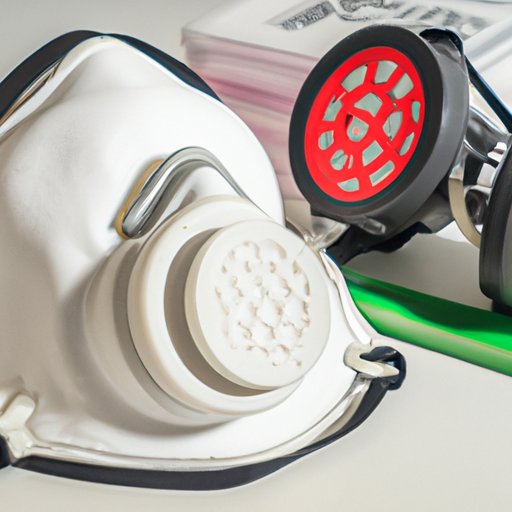Introduction
Respirator fit testing is a process that helps determine if a respirator fits properly on an individual. It also measures leakage from the respirator and evaluates how well the respirator seals against the face of the user. This type of testing is very important for ensuring workers’ safety when using respirators in hazardous environments. In this article, we will explore who can perform respirator fit testing, including the benefits of having an expert do it and what you need to know about respirator fit testing trainers.

Exploring Who Is Qualified to Perform Respirator Fit Testing
The Occupational Safety and Health Administration (OSHA) requires all employers to conduct fit tests on their employees who must wear respirators. Employers have the option to use either a trained employee or an outside contractor to perform the fit test. However, it is highly recommended that employers use an expert to ensure proper testing and results.
Benefits of Having an Expert Perform Respirator Fit Testing
Having an expert perform the respirator fit testing has many advantages. An expert will be able to provide more accurate results than an untrained person. They will also be able to explain why certain results were obtained and how to improve the fit of the respirator if needed. Additionally, an expert will be able to help employers keep up with the latest safety regulations and provide guidance on how to best protect their workers.
According to a study conducted by the National Institute for Occupational Safety and Health (NIOSH), “The use of a qualified fit tester is recommended because they are familiar with the various types of respirators and the different methods used to test them.” An expert will also be better equipped to evaluate the fit of a variety of respirator models and sizes.
What You Need to Know About Respirator Fit Testing Trainers
When looking for a respirator fit testing trainer, it is important to make sure that the person is certified and experienced in conducting respirator fit tests. The trainer should possess knowledge of the different types of respirators and the safety protocols involved in performing the tests. It is also important to find out if the trainer is familiar with the regulations set forth by OSHA and other regulatory agencies.
In addition to being knowledgeable about the respirator fit testing process, the trainer should also be competent in communication and customer service. The trainer should be able to explain the process to employers and employees alike, answer any questions they may have, and provide helpful advice. A good respirator fit testing trainer will also have a solid understanding of the safety standards required by OSHA and other organizations.
What the Job of a Respirator Fit Tester Entails
A respirator fit tester’s job is to ensure that respirators fit properly on individuals. They must have extensive knowledge of the different types of respirators and the safety protocols involved in performing the tests. They must also be able to accurately measure and record the results of the tests.
Different Types of Respirator Fit Testing and Who Can Do Them
There are three main types of respirator fit tests: qualitative, quantitative, and combination. Qualitative fit tests involve using a test agent to detect leakage around the respirator. Quantitative fit tests measure the amount of leakage in the respirator. Combination fit tests involve a combination of both qualitative and quantitative methods. All three types of tests can be performed by a qualified respirator fit tester.
Examining the Qualifications Necessary for Performing Respirator Fit Testing
To become a respirator fit tester, one must have the appropriate training and certification. OSHA requires that all respirator fit testers have completed a recognized respirator fit tester course and passed an examination. The courses typically cover topics such as respirator selection, fit testing procedures, and safety regulations. Additionally, fit testers must also meet any other qualifications required by OSHA and other regulatory agencies.
Conclusion
Respirator fit testing is a critical step in ensuring that workers remain safe in hazardous environments. It is important to make sure the person performing the fit test is qualified and experienced. An expert will be able to provide more accurate results and help employers stay up-to-date on the latest safety regulations. When selecting a respirator fit tester, employers should look for someone who is certified and experienced in conducting respirator fit tests, has a strong understanding of the safety protocols involved, and is competent in communication and customer service.
Summary of Main Points
This article explored who can perform respirator fit testing. We discussed the benefits of having an expert do it, what you need to know about respirator fit testing trainers, and what the job of a respirator fit tester entails. We also examined the different types of respirator fit tests and the qualifications necessary for performing them.
Final Recommendations
Employers should always use an expert to perform respirator fit tests to ensure accuracy and safety. They should also look for a respirator fit tester who is certified and experienced in conducting respirator fit tests and has a strong understanding of the safety protocols involved. Finally, the respirator fit tester should be competent in communication and customer service.
(Note: Is this article not meeting your expectations? Do you have knowledge or insights to share? Unlock new opportunities and expand your reach by joining our authors team. Click Registration to join us and share your expertise with our readers.)
